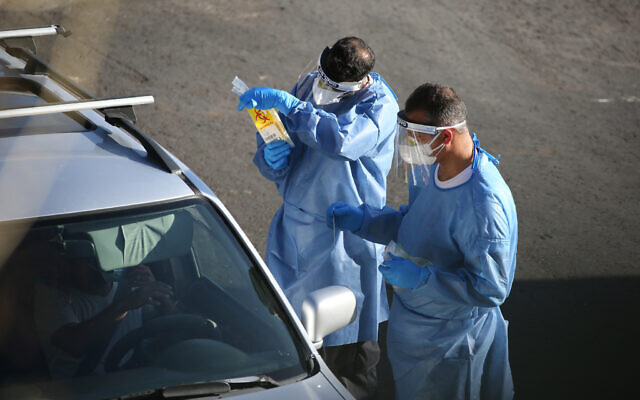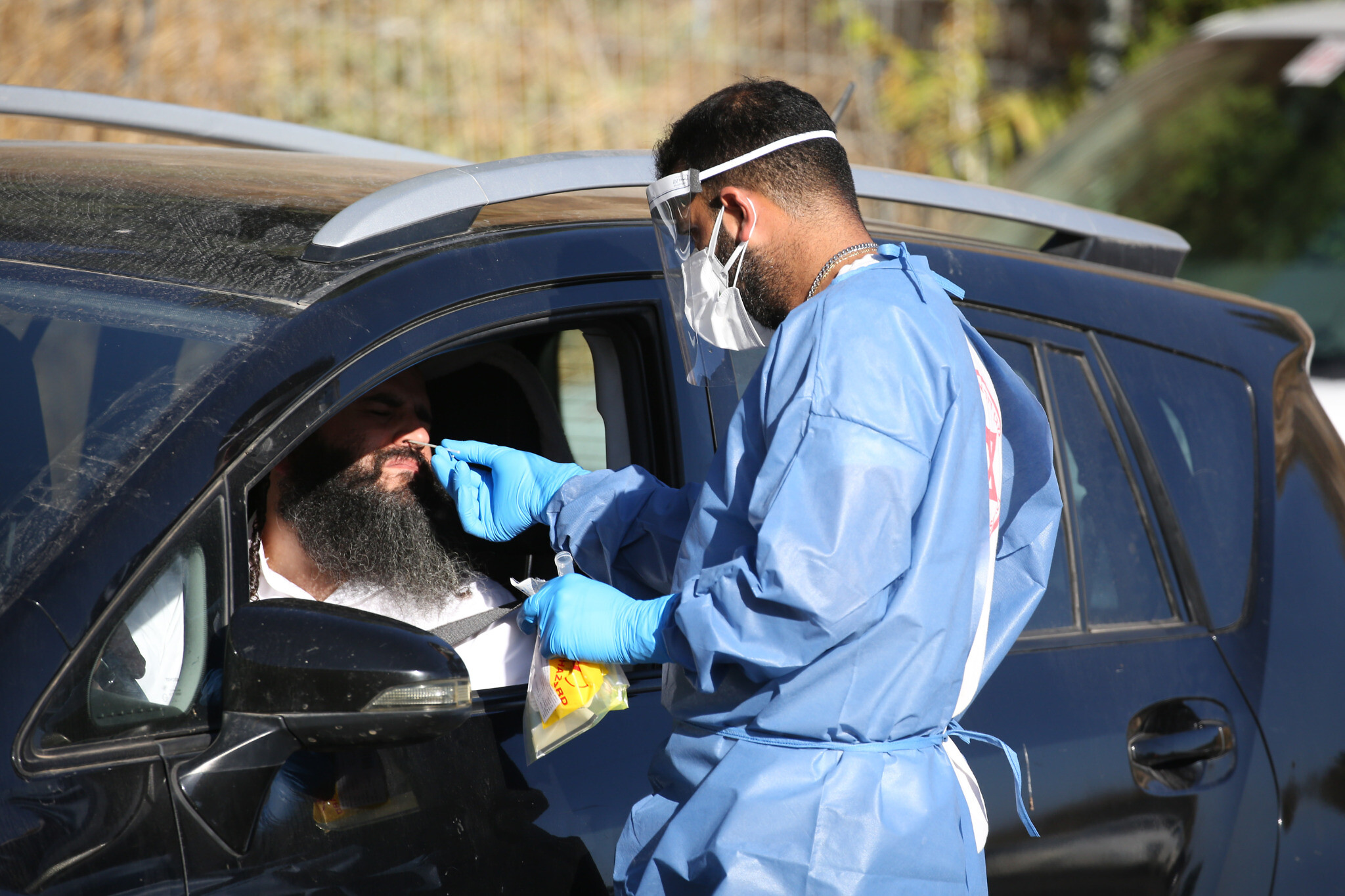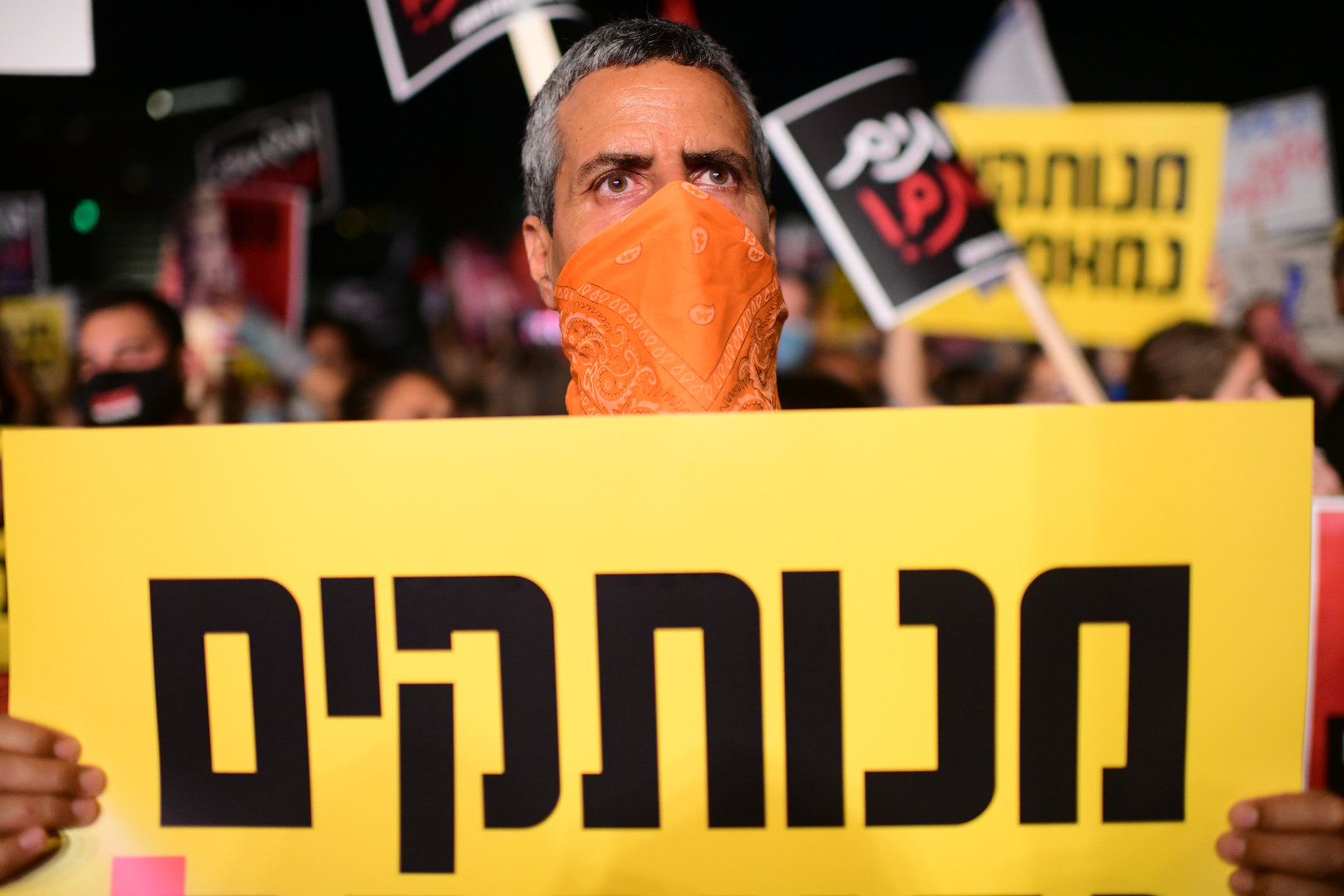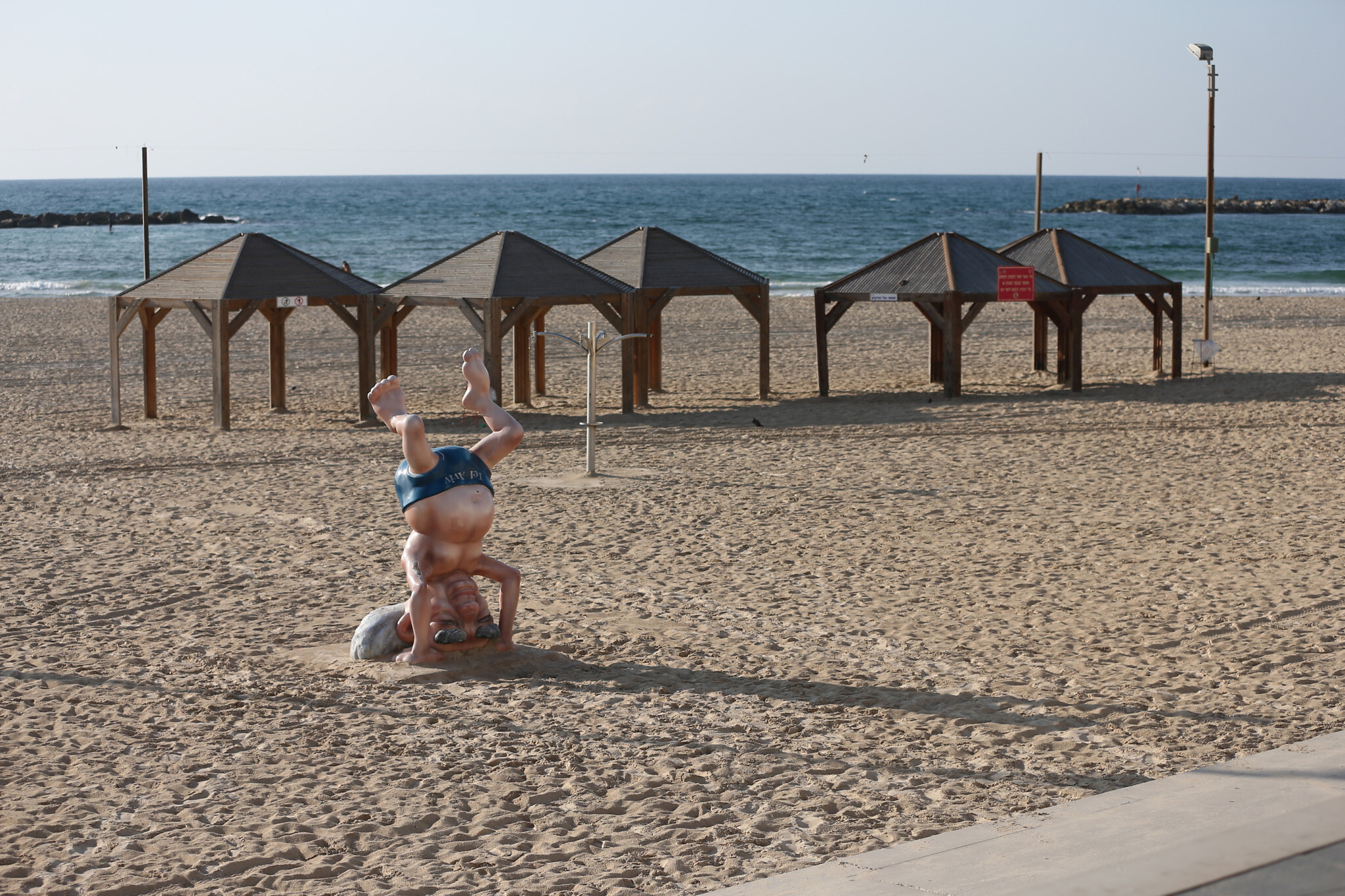Israel prepares refrigerated pandemic morgues. How did it get here?
The Jewish state has become the world’s foremost cautionary tale, stuck in one of the worst second waves of cases on the planet, one that's showing no evidence of slowing down.

Israel has been known as a country that can rise to face a crisis — usually of the military kind — quickly and efficiently.
The country’s response to the coronavirus pandemic in its early months garnered international praise, and Prime Minister Benjamin Netanyahu at one point boasted that “the world is learning from us.”
But now Israel has become the world’s foremost cautionary tale, stuck in one of the worst second waves of cases on the planet, one that is showing no evidence of slowing down.
On Thursday morning, the country’s health ministry reported a record high of nearly 9,000 COVID-19 cases in the previous 24 hours — the equivalent of well over 300,000 in the United States. Hospitals are filled to capacity and threatening to close, and the government has significantly tightened a second lockdown that began on the Rosh Hashanah holiday. Israelis are now limited to traveling just over a half mile from their homes.
It gets more gruesome: Last week, Israeli media reported that Haifa’s chevra kadisha, or ritual burial society, was preparing refrigerated shipping containers in which to store the bodies of the dead, until they could be buried, and that other cities were preparing to do the same.
How did Israel get here? There are many factors.
A weak government could not act decisively
In March, Benny Gantz, the man who came close to unseating Netanyahu in three consecutive elections in less than a year, laid down his proverbial arms and struck a deal with Netanyahu to finally form a government coalition. Gantz, who some called patriotic and others called politically naive, deemed it an “emergency” unity government and said it would “fight the coronavirus and look out for all Israeli citizens.”
In the end, it has done neither effectively.
The two main sides of the government — Netanyahu’s Likud Party and Gantz’s Blue and White coalition, which has splintered and shrunk after his deal with Netanyahu — have been working at cross-purposes from the start. They have argued over almost every aspect of government and haven’t been able to pass a national budget for 2020 — which is of course three-quarters over.
If a budget isn’t approved by Dec. 23, another round of elections will be triggered. And Netanyahu isn’t exactly against this, for a couple of reasons. In the deal that he signed with Gantz, he agreed to step down to allow Gantz to become prime minister after 18 months. Netanyahu would love for the deal to not last that long, and to keep his grip on the role.
Gantz’s coalition, as mentioned, is also in pieces, leaving less in Netanyahu’s way when it comes to significantly consolidating his power in the next election.
Meanwhile, the ineffective government has not filled several top civil servant positions, including the state prosecutor and the chief of police. Coronavirus czar Ronni Gamzu was appointed without the basic authority that he needs to implement his programs, and his plans have been weakened by the government’s constant bending to pressure from different sectors of the public.
“The same government that appointed [Gamzu] has no problem with subverting or eroding some of his main recommendations and to water them down,” said Yohanan Plesner, president of the Israel Democracy Institute.
Rather than operating as it should, the coalition is in many ways acting like an interim government and is operating as if it is “sliding toward an election campaign,” Plesner added.

Netanyahu’s eyes were elsewhere, even amid protest at home
Israel began coming out of its first lockdown in early May, opening businesses, restaurants and schools. It had four months to prepare for the challenges of any second wave.
But besides the domestic politicking, Netanyahu was also preoccupied with bigger moves that he knew would add to his diplomatic legacy. He flirted with the idea of annexing parts of the West Bank by July 1, an idea that drew criticism from an unusually wide range of stakeholders — including the Trump administration and even some settlers, whom Netanyahu has successfully courted for years.
Then in the fall, with the help of the Trump team, Israel signed normalization deals with the United Arab Emirates and Bahrain, two of Israel’s Arab neighbours. Netanyahu attended a signing ceremony for the so-called Abraham Accords in Washington, D.C. just days before the beginning of Israel’s second lockdown went into effect, giving him just the right visuals to mount a new election campaign, whenever relevant.
There would, of course, be competing visuals from the anti-Netanyahu protests that grew over the course of the summer and fall. Critics of the prime minister gathered outside his Jerusalem home weekly to call attention to his poor handling of the coronavirus crisis and his governing while under indictment for corruption. The protests grew to include disparate segments of Israeli society and at times resulted in violent clashes between police and protesters. This week, the government enacted steep restrictions on protests as part of its pandemic response, effectively ending the weekly public display of resistance.

The economy opened too quickly
The seemingly successful quick reopening of Israel’s economy that drew so much praise proved to be dangerous, and all sides of the government have admitted it.
Israel began coming out of its first lockdown in late April. Some retail outlets were allowed to open, with a limited number of customers at a time. Schools then reopened, followed by hotels, malls and gyms, then restaurants, cultural venues and event halls, all operating at less than full capacity.
But by July, some restrictions — including on gyms, public pools, event halls, bars, clubs and cultural shows — were reimposed as coronavirus cases began rising again. Israelis had headed to beaches and restaurants, unmasked, too early, encouraged by a government that figured it had conquered the virus.
In the hours before the start of Yom Kippur, Netanyahu acknowledged that the country opened too fast after the first lockdown. “Did we make mistakes in the past? Of course,” Netanyahu said in a Hebrew video posted on social media. “Our decision to open event halls was too fast. Perhaps also the decision to reopen all schools.”
Gantz agreed, saying that the country was also too slow to implement widespread contact tracing. On Saturday night in an interview on Channel 12’s “Meet the Press” show, Gantz apologised, saying the government had been too involved in political squabbles to get their jobs done.
Despite the now out-of-control COVID caseload, there is still opposition to the second strict lockdown — from Gamzu, the coronavirus czar himself.
Gamzu said last week that he preferred the idea of “a slight tightening of the lockdown, to prevent serious damage to the economy.” By that night, he called the government’s decision to implement a total lockdown “disgusting,” added that he would have to take an “anti-nausea pill.”

Schools continue to be a culprit
When Israeli schools reopened for the first time in May, things did not go very well.
The announcement that schools were opened came out days before the planned reopening date. A patchwork of policies and guidelines left administrators scrambling. Hundreds of teachers, students and their relatives contracted the virus quickly. In less than two weeks, dozens of cities shut down their school systems.
Still, with many Israeli parents sick of home schooling and supervising, clamoring to send their children back to school, Education Minister Yoav Gallant insisted in July that the next school year should start on time on Sept. 1 — and it did, despite widespread objections from teachers.
That didn’t last long either. Almost immediately, outbreaks were associated with schools, and classes, grades and even entire schools were sent into quarantine. Even as students were lumped into “capsules” to limit exposure to each other, teachers moved between capsules, potentially spreading disease between them. (The country had too few teachers to reduce class sizes and had tried to mount a rapid hiring effort.) The situation became so acute that schools ended up closing before the general lockdown on Rosh Hashanah.
The emphasis on getting students back to school meant that little attention had been given to what would happen if they needed to learn from home again.
“I believe that we made a mistake and missed an opportunity to develop the distance learning components,” said Zimra Vigoda, a parent whose daughter’s school switched to virtual learning earlier in September when there were too few unexposed teachers to operate in person.
“The administration and teachers worked hard to develop the pod-based learning and added a multitude of interesting courses but, here in Israel, the land of apparent perpetual optimism, nobody, including myself, really wanted to believe that in-person learning would not be possible this year,” Vigoda said.
The Charedi Orthodox have shaped the response
Last month, the government flagged some 40 cities and towns, most of them haredi Orthodox and Arab, as “red light” communities — or areas with higher infection rates that would be hit with individualised and stricter restrictions than the rest of the country. This “traffic light” system of categorisation has been used successfully in other countries, and Gamzu is a proponent of it.
But after Orthodox religious politicians threatened to abandon Netanyahu and his government coalition over the red light rules, which would have included a strict lockdown, the communities instead only received night time curfews.
The incident highlighted how important the Charedi Orthodox have become to Netanyahu politically and how he is willing to bend the rules for them. It also displayed how COVID-19 has spread further in some Orthodox communities, where continuing to gather in large groups to pray and celebrate has trumped precaution. It’s a trend in Orthodox communities around the world, including Brooklyn, where local authorities have threatened to crack down in heavily Orthodox neighborhoods where infection rates are high.
A symbol of this tension has been Yaakov Litzman, the haredi former health minister. He resigned that position in April, after reports claimed he contracted the virus from attending a prayer group that his ministry had banned. Litzman became housing minister, but he resigned that post as well in protest over the new lockdown restrictions imposed on Rosh Hashanah in time for High Holiday prayer services.
Not all Charedi Orthodox have been anti-social distancing, however — for example, Aryeh Deri, Israel’s interior minister who also heads the Sephardic Orthodox Shas Party, compared ignoring the lockdown rules to murder earlier this month. And the Shas Council of Torah Sages on Tuesday called for prayer services to be held outside only and according to current coronavirus regulations.
Right now, Charedi Israelis make up 40% of new cases, despite amounting to just 12% of the population. That proportion has continued to generate criticism from more secular Israelis about why the entire country is under lockdown. But even without those cases, the country would have an infection rate that exceeds what public health experts say is safe.
“Don’t call me a freier” — the psychology of Israelis
The word “freier” in Hebrew roughly translates to “sucker” — someone who gets taken advantage of. Avoiding being a freier is a top priority in Israeli culture these days — a concept that is a far cry from the socialist kibbutz culture that reigned in the country’s early days.
In the context of the pandemic and social distancing, the anti-freier line of thinking goes: Why should I adhere to the coronavirus restrictions when I see my neighbors and friends flouting the rules? Why should they enjoy the opened economy and life without a mask, and not me?
That culture may be hurting Israel’s ability to contain the virus. In Haaretz, Anshel Pfeffer wrote that Israelis have been “too busy looking at other sectors and demanding ‘equal’ rights to be infected.” In the Jerusalem Post, Liat Collins wrote, “Now is the time to fear the spread of corona, not the Israeli fear of being considered a ‘freier.’”
There’s also the psychological downside of that successful reputation for rising to meet a crisis. More Israelis have died of COVID-19 than from terror attacks, but with sickness and death hidden away inside hospitals, the pandemic is not eliciting the same reaction.
“Israelis can sometimes be a little bit too resilient,” said Alison Kaplan Sommer, a journalist at Haaretz, said during a recent panel discussion. “Our fear threshold is very high. We lived through all of these traumas and all of these wars and that’s damaged us in our ability to take this virus seriously. … The national psychology is a big part of the story.”

Thank you for helping to make Jewish News the leading source of news and opinion for the UK Jewish community. Today we're asking for your invaluable help to continue putting our community first in everything we do.
For as little as £5 a month you can help sustain the vital work we do in celebrating and standing up for Jewish life in Britain.
Jewish News holds our community together and keeps us connected. Like a synagogue, it’s where people turn to feel part of something bigger. It also proudly shows the rest of Britain the vibrancy and rich culture of modern Jewish life.
You can make a quick and easy one-off or monthly contribution of £5, £10, £20 or any other sum you’re comfortable with.
100% of your donation will help us continue celebrating our community, in all its dynamic diversity...
Engaging
Being a community platform means so much more than producing a newspaper and website. One of our proudest roles is media partnering with our invaluable charities to amplify the outstanding work they do to help us all.
Celebrating
There’s no shortage of oys in the world but Jewish News takes every opportunity to celebrate the joys too, through projects like Night of Heroes, 40 Under 40 and other compelling countdowns that make the community kvell with pride.
Pioneering
In the first collaboration between media outlets from different faiths, Jewish News worked with British Muslim TV and Church Times to produce a list of young activists leading the way on interfaith understanding.
Campaigning
Royal Mail issued a stamp honouring Holocaust hero Sir Nicholas Winton after a Jewish News campaign attracted more than 100,000 backers. Jewish Newsalso produces special editions of the paper highlighting pressing issues including mental health and Holocaust remembrance.
Easy access
In an age when news is readily accessible, Jewish News provides high-quality content free online and offline, removing any financial barriers to connecting people.
Voice of our community to wider society
The Jewish News team regularly appears on TV, radio and on the pages of the national press to comment on stories about the Jewish community. Easy access to the paper on the streets of London also means Jewish News provides an invaluable window into the community for the country at large.
We hope you agree all this is worth preserving.





















